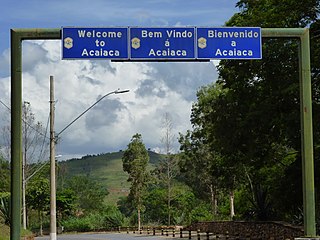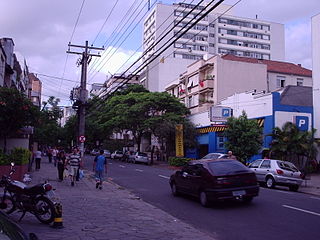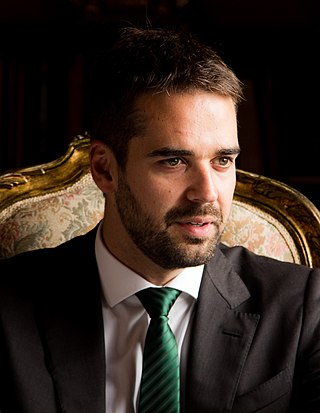
Vitor Ramil (born April 7, 1962, Pelotas, Rio Grande do Sul) is a musician, singer, composer and writer from Brazil. [1]

Vitor Ramil (born April 7, 1962, Pelotas, Rio Grande do Sul) is a musician, singer, composer and writer from Brazil. [1]
"Satolep" is an anagram for Pelotas, city where the artist was born. In his book "A Estetica do Frio", the author mentions that Satolep is his idealization of his hometown. [3] He uses the word in several songs and writing works.

Rio Grande do Sul is a state in the southern region of Brazil. It is the fifth-most populous state and the ninth-largest by area. Located in the southernmost part of the country, Rio Grande do Sul is bordered clockwise by Santa Catarina to the north and northeast, the Atlantic Ocean to the east, the Uruguayan departments of Rocha, Treinta y Tres, Cerro Largo, Rivera, and Artigas to the south and southwest, and the Argentine provinces of Corrientes and Misiones to the west and northwest. The capital and largest city is Porto Alegre. The state has the highest life expectancy in Brazil, and the crime rate is relatively low compared to the Brazilian national average. Despite the high standard of living, unemployment is still high in the state, as of 2017. The state has 5.4% of the Brazilian population and it is responsible for 6.6% of the Brazilian GDP.

Milonga is a musical genre that originated in the Río de la Plata areas of Argentina, Uruguay, and the Brazilian state of Rio Grande do Sul. It is considered a precursor of the tango.

Pelotas is a Brazilian city and municipality (município), the fourth most populous in the southern state of Rio Grande do Sul, after Porto Alegre, Caxias do Sul and Canoas. It is located 270 km (168 mi) from Porto Alegre, the state's capital city, and 130 km (80.8 mi) from the Uruguayan border. The Lagoa dos Patos lies to the east and the São Gonçalo Channel lies to the south, separating Pelotas from the city of Rio Grande.

Nilcedes Soares de Magalhães, known professionally as Glória Menezes, is a Brazilian actress.

Grêmio Esportivo Brasil, commonly referred to as Brasil de Pelotas, is a Brazilian professional club based in Pelotas, Rio Grande do Sul founded on 7 September 1911. It competes in the Campeonato Brasileiro Série D, the fourth tier of Brazilian football, as well as in the Campeonato Gaúcho, the top flight of the Rio Grande do Sul state football league.

Fabrício Carpi Nejar or Fabricio Carpinejar is a Brazilian writer. He was born in Caxias do Sul, Rio Grande do Sul. His father is the poet Carlos Nejar.

Teixeirinha, given name Vitor Mateus Teixeira, was a Brazilian musician. Teixeirinha is the diminutive form of the common Portuguese-language surname of Teixeira, is one of the greatest Brazilian artists, Teixeirinha was the first artist in the world to sell 1 million copies of a disc of only one recorded song, called "O Rei do Disco" by this record sales, currently has sold 130 million copies.

Portuguese is the official and national language of Brazil being widely spoken by most of the population. Brazil is the most populous Portuguese-speaking country in the world, with its lands comprising the majority of Portugal's former colonial holdings in the Americas.

Zé Ramalho is a Brazilian composer and performer. Zé Ramalho has collaborated with various major Brazilian musicians, including Vanusa, Geraldo Azevedo and Alceu Valença.

Daniel Galera is a Brazilian writer, translator and editor. He was born in São Paulo, but was raised and spent most of his life in Porto Alegre, until 2005 when he went back to São Paulo. He is considered by critics to be one of the most influential young authors in Brazilian literature. Between 1998 and 2001, as a student at the Federal University of Rio Grande do Sul, he wrote for the literary e-zine Cardosonline; among the collaborators were André Czarnobai, Clara Averbuck and Daniel Pellizari.

José Antônio Rezende de Almeida Prado or Almeida Prado was an important Brazilian composer of classical music and a pianist. On Almeida Prado's death, his personal friend, conductor João Carlos Martins stated that Prado had possibly been the most important Brazilian composer ever.

Melanie Nunes Fronckowiak is a Brazilian actress, writer, and TV host. Fronckowiak became known after starring in several advertising and TV commercials while working as a model in São Paulo, at the Ford Models agency, which led her to participate in the Brazilian teen telenovela Rebelde, playing the character of Carla. In 2013, Fronckowiak launched herself as a writer. In her first book, Inclassificável: Memórias da Estrada, she tells the experiences she lived traveling around forty Brazilian cities with the band Rebeldes.

Esporte Clube Pelotas, more commonly referred to as Pelotas, is a professional football club based in Pelotas, Rio Grande do Sul, Brazil. Founded in 1908, it plays in the Campeonato Gaúcho, the state of Rio Grande do Sul's premier state league, holding home games at Estádio Boca do Lobo, with a 23,336-seat capacity.
SAVAG – Sociedade Anônima Viação Aérea Gaúcha was a Brazilian airline founded in 1946 that operated mainly in the state of Rio Grande do Sul. It was absorbed by Cruzeiro do Sul in 1966.

Bom Fim is a neighborhood in the city of Porto Alegre, the state capital of Rio Grande do Sul in Brazil. It was created by the law number 2022 from December 7, 1959.
Luiz António Gaino Jr., known as Júnior Paulista is a Brazilian footballer who plays for Esporte Clube Santo André.

Michel Laub is a Brazilian writer and journalist.

Aldyr Garcia Schlee was a Brazilian writer, journalist, translator, illustrator, and professor.

Eduardo Figueiredo Cavalheiro Leite is a Brazilian politician and governor of the state of Rio Grande do Sul. During the state's 2018 election, he won with 53.62% of the vote. Leite was elected governor at 33 years old, becoming the youngest governor in Brazil. In July 2021, Leite came out as gay during an interview for the Brazilian talk show Conversa com Bial, becoming the first openly gay governor in Brazil's history, and second openly LGBT governor in Brazil after Fátima Bezerra of Rio Grande do Norte.

Miss Rio Grande do Sul is a Brazilian Beauty pageant which selects the representative for the State of Rio Grande do Sul at the Miss Brazil contest. The pageant was created in 1954 and has been held every year since with the exception of 1990, 1993, and 2020. The pageant is held annually with representation of several municipalities. Since 2023, Bebeto Azevêdo has been the state director of Miss Rio Grande do Sul. Rio Grande do Sul is the state with the most crowns in the national contest and also the state that produced the first Miss Brazil to win the Miss Universe contest, Iêda Maria Vargas of Porto Alegre.